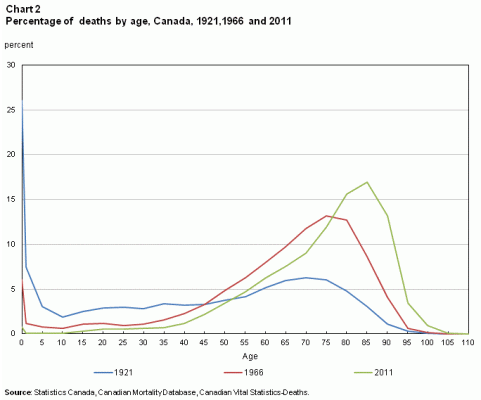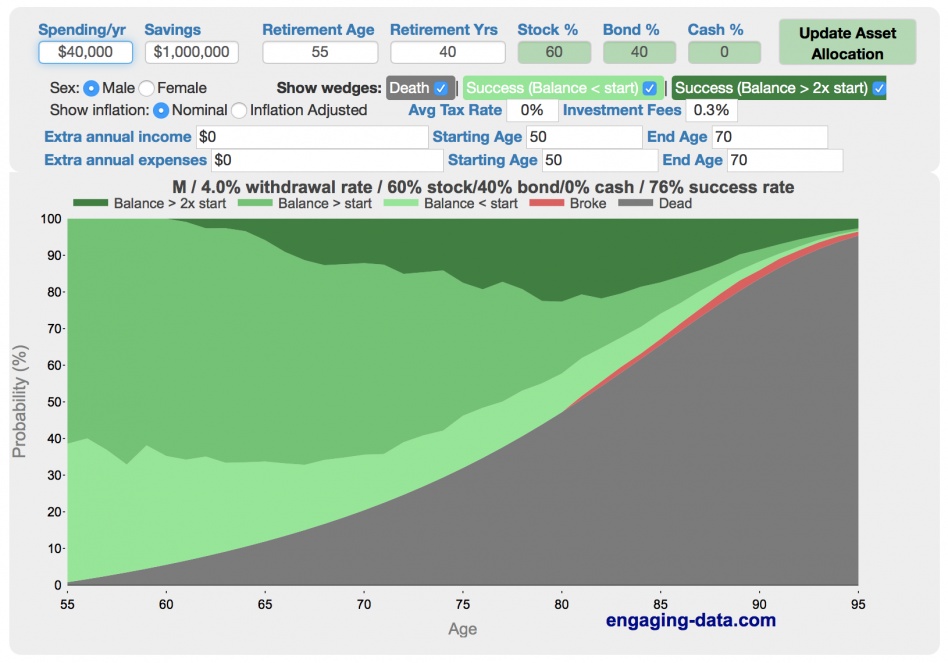jjquantz
Full time employment: Posting here.
Hey all, we spend a lot of time talking about life expectancy and how it might be "different now" . Often this involves financial planning, sometimes health issues and even, on occasion, philosophy.
I think that the single best discussion of life expectancy changes in the developed world is located here: https://www150.statcan.gc.ca/n1/pub/82-624-x/2014001/article/14009-eng.htm
One graph really summarizes the changes that have occurred:
The blue line shows the percentage of deaths at all ages in Canada in 1921, the red line is the same in 1966 and the green line in 2011. The text goes on to explain what is pretty clear in the graph. Gains in life expectancy between 1921 and 1966 were largely due to drops in infant mortality, the eradication of childhood illnesses through vaccinations and the use of antibiotics to stop deaths from infection. The single largest contribution to gains between 1966 and 2011 was better treatment of circulatory system diseases, i.e. heart disease.
What is most striking to me, however, is the pretty obvious hard stop at 90-95. The text describes this as an apparent "natural limit."
Future life expectancy gains are going to have to come about by addressing the issue of aging, not by continuing our, admittedly successful, war on disease. Until the anti-aging breakthrough comes, it looks like we are going to continue to kick the bucket at 90 or so.
A key phrase from the report: Over the past 90 years, life expectancy has not greatly increased for those over 75 years of age.
I think that the single best discussion of life expectancy changes in the developed world is located here: https://www150.statcan.gc.ca/n1/pub/82-624-x/2014001/article/14009-eng.htm
One graph really summarizes the changes that have occurred:
The blue line shows the percentage of deaths at all ages in Canada in 1921, the red line is the same in 1966 and the green line in 2011. The text goes on to explain what is pretty clear in the graph. Gains in life expectancy between 1921 and 1966 were largely due to drops in infant mortality, the eradication of childhood illnesses through vaccinations and the use of antibiotics to stop deaths from infection. The single largest contribution to gains between 1966 and 2011 was better treatment of circulatory system diseases, i.e. heart disease.
What is most striking to me, however, is the pretty obvious hard stop at 90-95. The text describes this as an apparent "natural limit."
Future life expectancy gains are going to have to come about by addressing the issue of aging, not by continuing our, admittedly successful, war on disease. Until the anti-aging breakthrough comes, it looks like we are going to continue to kick the bucket at 90 or so.
A key phrase from the report: Over the past 90 years, life expectancy has not greatly increased for those over 75 years of age.


